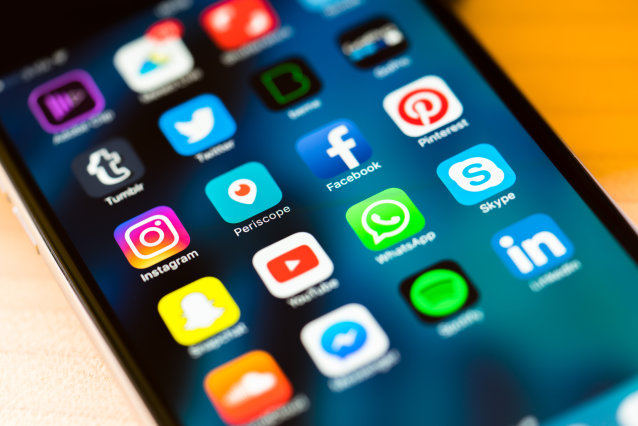Social media apps are ‘deliberately’ addictive to users
- Posted on
- Comment

Social media companies are deliberately addicting users to their products for financial gain, Silicon Valley insiders have told the BBC’s Panorama programme.
“It’s as if they’re taking behavioral cocaine and just sprinkling it all over your interface and that’s the thing that keeps you like coming back and back and back”, said former Mozilla and Jawbone employee Aza Raskin.
“Behind every screen on your phone, there are generally like literally a thousand engineers that have worked on this thing to try to make it maximally addicting” he added.
In 2006 Mr. Raskin, a leading technology engineer himself, designed infinite scroll, one of the features of many apps that is now seen as highly habit-forming. At the time, he was working for Humanized – a computer user-interface consultancy.
Infinite scroll allows users to endlessly swipe down through content without clicking.
“If you don’t give your brain time to catch up with your impulses,” Mr. Raskin said, “you just keep scrolling.”
He said the innovation kept users looking at their phones far longer than necessary.
Mr. Raskin said he had not set out to addict people and now felt guilty about it.
But, he said, many designers were driven to create addictive app features by the business models of the big companies that employed them.
“In order to get the next round of funding, in order to get your stock price up, the amount of time that people spend on your app has to go up,” he said.
“So, when you put that much pressure on that one number, you’re going to start trying to invent new ways of getting people to stay hooked.”
Lost time
A former Facebook employee made a related point.
“Social media is very similar to a slot machine,” said Sandy Parakilas, who tried to stop using the service after he left the company in 2012.
“It literally felt like I was quitting cigarettes.”
During his year and five months at Facebook, he said, others had also recognized this risk.
“There was definitely an awareness of the fact that the product was habit-forming and addictive,” he said.
“You have a business model designed to engage you and get you to basically suck as much time out of your life as possible and then selling that attention to advertisers.”
Facebook told the BBC that its products were designed “to bring people closer to their friends, family, and the things they care about”.
It said that “at no stage does wanting something to be an addictive factor into that process”.
Like’s legacy
One of the most alluring aspects of social media for users is “likes”, which can come in the form of the thumbs-up sign, hearts, or retweets.
Leah Pearlman, co-inventor of Facebook’s Like button, said she had become hooked on Facebook because she had begun basing her sense of self-worth on the number of “likes” she had.
“When I need validation – I go to check Facebook,” she said.
“I’m feeling lonely, ‘Let me check my phone.’ I’m feeling insecure, ‘Let me check my phone.’”
Ms. Pearlman said she had tried to stop using Facebook after leaving the company.
“I noticed that I would post something that I used to post and the ‘like’ count would be way lower than it used to be.
“Suddenly, I thought I’m actually also kind of addicted to the feedback.”
Vulnerable teens
Studies indicate there are links between overusing social media and depression, loneliness and a host of other mental problems.
In Britain, teenagers now spend about an average of 18 hours a week on their phones, much of it using social media.
Ms. Pearlman believes youngsters who recognize that social media is problematic for them should also consider steering clear of such apps.
“The first things I would say is for those teenagers to step into a different way of being because, with a few leaders, it can help others follow,” she said.
Last year Facebook’s founding president, Sean Parker, said publicly that the company set out to consume as much user time as possible.
He claimed it was “exploiting a vulnerability in human psychology”.
But Ms. Pearlman said she had not intended the Like button to be addictive.
She also believes that social media use has many benefits for lots of people.
When confronted with Mr. Parker’s allegation that the company had effectively sought to hook people from the outset, senior Facebook official Ime Archibong told the BBC it was still looking into the issue.
“We’re working with third-party folks that are looking at habit-forming behaviours – whether it’s on our platform or the internet writ large – and trying to understanding if there are elements that we do believe are bringing harm to people,” he said, “so that we can shore those up and we can invest in making sure those folks are safe over time.”
Recent reports indicate Facebook is working on features to let users see how much time they have spent on its app over the previous seven days and to set daily time limits.
The Panorama programme also explores the use of color, sounds, and unexpected rewards to drive compulsive behavior.
Twitter declined to comment.
Snap said it was happy to support the frequent creative use of its app, Snapchat. But it denied using visual tricks to achieve this and added that it had no desire to increase empty engagement of the product.
Source: BBC










 (Selorm) |
(Selorm) |  (Nana Kwesi)
(Nana Kwesi)